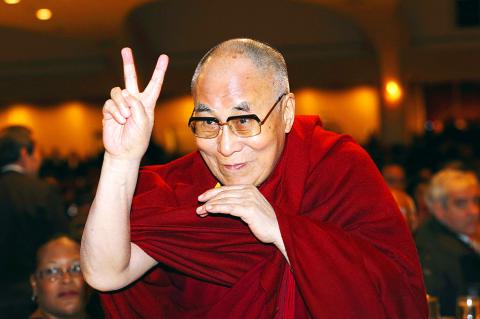US President Barack Obama warmly acknowledged the Dalai Lama on Thursday, but did not meet him directly at a religious event in Washington closely watched by China, which has warned against any exchange with Tibet’s exiled spiritual leader.
Obama and the Dalai Lama were both at an annual prayer breakfast where Obama spoke about the importance of religious freedom.
Obama greeted the Buddhist monk with a bow-like gesture and called him “a good friend” and “a powerful example of what it means to practice compassion and who inspires us to speak up for the freedom and dignity of all human beings.”

Photo: Reuters
The Dalai Lama was in the audience at a table in the front row across from the president, along with senior Obama adviser Valerie Jarrett, a signal of White House support.
Obama nodded and smiled at the Dalai Lama, waving after clasping his hands to greet the spiritual leader as the event began.
China’s Ministry of Foreign Affairs, when asked about the event, repeated its opposition to any country “using the Tibet issue to interfere in China’s domestic affairs,” but did not directly condemn Obama, likely because there was no face-to-face meeting.
“The Dalai Lama is a political exile who has long waved the flag of religion to engage in anti-China separatist activities,” ministry spokesman Hong Lei (洪磊) told a daily news briefing.
The Dalai Lama has said he wants autonomy for Tibet and does not advocate violence.
The Chinese state-run Xinhua news agency took a strong line.
“Chumming with a secessionist is playing with fire,” it said.
Obama and the Dalai Lama are both Nobel Peace Prize laureates and have met three times.
At the event, Obama echoed some of the religious leader’s teachings, calling for religious tolerance and noting that too often, faith is twisted to justify violence.
“We see faith driving us to do right, but we also see faith being twisted and distorted, used as a wedge or, worse, sometimes used as a weapon,” he said, citing recent attacks in Pakistan and Paris.

MORE VISITORS: The Tourism Administration said that it is seeing positive prospects in its efforts to expand the tourism market in North America and Europe Taiwan has been ranked as the cheapest place in the world to travel to this year, based on a list recommended by NerdWallet. The San Francisco-based personal finance company said that Taiwan topped the list of 16 nations it chose for budget travelers because US tourists do not need visas and travelers can easily have a good meal for less than US$10. A bus ride in Taipei costs just under US$0.50, while subway rides start at US$0.60, the firm said, adding that public transportation in Taiwan is easy to navigate. The firm also called Taiwan a “food lover’s paradise,” citing inexpensive breakfast stalls

TRADE: A mandatory declaration of origin for manufactured goods bound for the US is to take effect on May 7 to block China from exploiting Taiwan’s trade channels All products manufactured in Taiwan and exported to the US must include a signed declaration of origin starting on May 7, the Bureau of Foreign Trade announced yesterday. US President Donald Trump on April 2 imposed a 32 percent tariff on imports from Taiwan, but one week later announced a 90-day pause on its implementation. However, a universal 10 percent tariff was immediately applied to most imports from around the world. On April 12, the Trump administration further exempted computers, smartphones and semiconductors from the new tariffs. In response, President William Lai’s (賴清德) administration has introduced a series of countermeasures to support affected

CROSS-STRAIT: The vast majority of Taiwanese support maintaining the ‘status quo,’ while concern is rising about Beijing’s influence operations More than eight out of 10 Taiwanese reject Beijing’s “one country, two systems” framework for cross-strait relations, according to a survey released by the Mainland Affairs Council (MAC) on Thursday. The MAC’s latest quarterly survey found that 84.4 percent of respondents opposed Beijing’s “one country, two systems” formula for handling cross-strait relations — a figure consistent with past polling. Over the past three years, opposition to the framework has remained high, ranging from a low of 83.6 percent in April 2023 to a peak of 89.6 percent in April last year. In the most recent poll, 82.5 percent also rejected China’s

PLUGGING HOLES: The amendments would bring the legislation in line with systems found in other countries such as Japan and the US, Legislator Chen Kuan-ting said Democratic Progressive Party (DPP) Legislator Chen Kuan-ting (陳冠廷) has proposed amending national security legislation amid a spate of espionage cases. Potential gaps in security vetting procedures for personnel with access to sensitive information prompted him to propose the amendments, which would introduce changes to Article 14 of the Classified National Security Information Protection Act (國家機密保護法), Chen said yesterday. The proposal, which aims to enhance interagency vetting procedures and reduce the risk of classified information leaks, would establish a comprehensive security clearance system in Taiwan, he said. The amendment would require character and loyalty checks for civil servants and intelligence personnel prior to